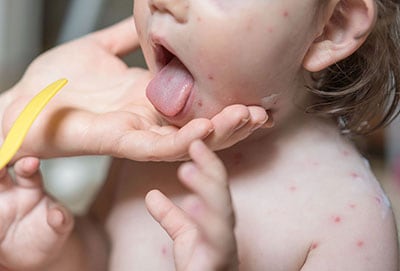Key points
- Chickenpox usually lasts about 4 to 7 days.
- A common sign of chickenpox is a rash that turns into itchy, fluid-filled blisters which eventually become scabs.
- Chickenpox can also be serious, even life-threatening, during pregnancy and in babies, adolescents, adults, and people with weakened immune systems.

Early symptoms
People who have never had chickenpox or the chickenpox vaccine can become ill. Typical symptoms that may begin to appear 1 to 2 days before rash include:
- Fever
- Tiredness
- Loss of appetite
- Headache

Common symptoms
The classic sign of chickenpox is a rash that turns into itchy, fluid-filled blisters which eventually become scabs. The rash may first appear on the chest, back, and face. The rash can then spread over the entire body, including inside the mouth, eyelids, or genital area. It usually takes about 1 week for all blisters to become scabs.
Chickenpox in vaccinated people (breakthrough chickenpox)
Some people who have been vaccinated against chickenpox can still get the disease. However, they usually have milder symptoms with fewer or no blisters (or just red spots) and mild or no fever. They are also sick for a shorter period of time than people who are not vaccinated. But some vaccinated people who get chickenpox may have disease similar to unvaccinated people.
Complications
Serious complications from chickenpox can occur, but they are not common in healthy people who get the disease. Chickenpox may cause several complications, such as:
- Bacterial infections of the skin and soft tissues in children, including Group A streptococcal infections
- Infection of the lungs (pneumonia)
- Infection or swelling of the brain (encephalitis, cerebellar ataxia)
- Bleeding problems (hemorrhagic complications)
- Bloodstream infections (sepsis)
- Dehydration
Some people experience complications from chickenpox and become so sick that they require hospitalization. In the most dangerous cases, chickenpox may lead to death. However, hospitalizations and deaths are rare today due to the U.S. chickenpox vaccination program.
Some deaths from chickenpox continue to occur in healthy, unvaccinated children and adults. In the past, many of the healthy adults who died from chickenpox contracted the disease from their unvaccinated children.
Who is at risk
People who experience a serious case of chickenpox and may also be at high risk for complications include:
- Infants
- Adolescents
- Adults
- Pregnant women
- People with weakened immune systems (body's ability to fight germs and sickness) caused by disease or medication. Examples:
- People with HIV/AIDS or cancer.
- Patients who have had transplants.
- People on chemotherapy, immunosuppressive medications, or long-term use of steroids.
- People with HIV/AIDS or cancer.

